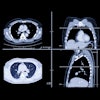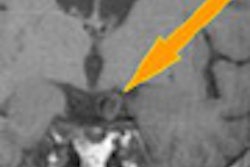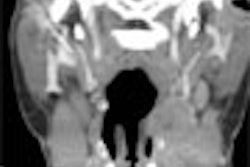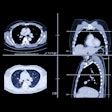A broad-based collaboration is under way between organizers of the International Symposium on Virtual Colonoscopy in Boston and the American College of Radiology (ACR) -- one that is expected to transform training, education, and certification for the rapidly developing imaging exam. The initiative is expected to include the ACR's assuming control of virtual colonoscopy's marquee conference in Boston from its current sponsor.
Over the next several years, the ACR will bring its considerable resources to bear on training, accreditation, and research for CT colonography, representatives of both organizations told AuntMinnie.com.
The goal is to "make sure that radiologists are the best trained and most experienced individuals to perform CTC" in an increasingly competitive healthcare environment, said ACR executive director Dr. Harvey Neiman.
The ACR expects that by 2008 or 2009, the International Symposium on Virtual Colonoscopy will leave its Boston birthplace for a spot in the Washington, DC, area, said Vinay Sandhir, project manager for the new education center set to open near the ACR's headquarters in Reston, VA. Neiman and Sandhir discussed the plans in a conference call with AuntMinnie.com last week.
State of the art
The ACR education center, which is under construction in a 10,000-square-foot office building across the street from ACR headquarters, is the most advanced training facility the organization has ever contemplated, according to Sandhir.
If all goes as planned, it will be inaugurated with a two-day hands-on virtual colonoscopy course, tentatively scheduled for January 20-21, with registration beginning in the fall.
"We're offering the learners to be able to emulate their clinical environment, and we have gotten the support of the leading workstation vendors to provide their software, and each workstation will act as a unique vendor," Sandhir said.
Attendees will each have their own workstations, from a total of 60 in the facility that will be equipped with high-resolution monitors and the latest virtual colonoscopy software from all of the leading CT colonography vendors. The learning experience will be quite different from the traditional course environment, which is often focused on presentations and questions, Neiman said.
"This is interactive, coached education -- we're calling it a 22nd century approach," Neiman said. "And we have an extremely complex and robust data center."
The data center will need to be robust, as it will be required to store, serve, and manage thousands of CTC datasets used in training, bootable software from each vendor, and even artificial intelligence modules that will tailor the learning experience to the needs of each participant, Neiman said.
Artificial intelligence? Say you've got three course participants -- A, B, and C -- with diverse backgrounds. They will all hear the same case presentation from a virtual colonoscopy educator, identify the same set of colorectal lesions, then answer a series of questions about the case, Neiman explained.
"Using AI (artificial intelligence), all three are presented with the same question to begin with," Neiman said. "Depending on their answer they will be taken on different pathways as the software recognizes the different expertise levels of the individuals, who will see a different series of cases or a different series of questions. Everyone's experience will be tailored to their level of knowledge and expertise."
As the radiologists work to bring their reading skills up to snuff, each will be required to complete a minimum of 50 cases. The center will be open at night for those who need more practice, or want to take on additional cases to improve their skills, Neiman said.
COPS on the VC beat
Once they've completed the course successfully, each participant will receive the ACR's new Certificate of Proficiency, or COP, in CT colonography. The COP, the ACR hopes, will become a widely accepted currency in the healthcare environment.
"We think this is an important tool for the radiologist as we see a landscape that's becoming more and more competitive, whether it be managed care, or requiring some sort of proficiency level, or a hostile credentialing environment, where the radiologist needs to be able to compete against others who claim expertise in this area," Neiman said. "The COP will be a documented form of proof that the individual has obtained this proficiency."
It's reasonable to expect that payors might eventually require proof of proficiency as a condition for reimbursement of VC studies, he added, and no VC-specific accreditation program is contemplated at this time.
Will the high-tech education center be ready for its January close-up? "All the guns are firing and we anticipate making it, but it's certainly a very complex project," Neiman said.
Symposium ponders a move
The International Symposium on Virtual Colonoscopy, to be held this fall in Boston, will consist of a research track (October 15-16) that includes the meeting's traditional presentation format, along with a two-day hands-on training track (October 16-17). Beyond 2007, the location of the symposium isn't quite finalized, according to Sandhir.
"All future hands-on training will take place at meetings at the ACR education center," he said. "Basically in 2008 there will be more collaboration between the ACR and the International Symposium, with potentially moving the entire symposium to the Washington, DC, area as early as 2008 -- but definitely by 2009."
As for the ACR's officially taking over the symposium from Boston University School of Medicine Continuing Medical Education, "We haven't dotted all the i's and crossed all the t's yet, but we're close," said Neiman, adding that the Boston organization will still run the 2007 meeting.
The infusion of new personnel and equipment will only enhance what has already been a very well managed venture in Boston, according to Neiman.
"I think one of the things we bring to the table is a number of individuals -- educators in radiology -- who can add additional expertise to the planning," he said.
Leading contributors to the new educational project include Dr. Lawrence Davis, ACR board member and professor of radiology at Long Island Jewish Medical Center in New Hyde Park, NY, as education center director; and Dr. Reuben Mezrich, chair of radiology at the University of Maryland Medical System in Baltimore, on the education center committee, Neiman said. They will collaborate with course director Dr. Matthew Barish, associate professor of radiology at Harvard Medical School in Boston, to build on the current course structure.
Whether the symposium moves south in 2008 or 2009 will basically depend on the whether existing hotel commitments can be changed, Sandhir said. And a hotel in the Washington, DC, area has yet to be chosen for the VC symposium. But the hands-on training program will definitely begin in Reston, VA, in 2008, he said.
VC competes
As the ACR ramps up its VC education efforts, radiologists are eagerly awaiting the results of the National CT Colonography Trial (ACRIN 6664), which for better or worse will be considered a crucial test of the technique. Initial results are expected later this year from the study, which aimed to screen approximately 2,500 subjects with both virtual and conventional colonoscopy at 15 institutions across the U.S.
If the trial results are positive, CTC is sure to get a boost in terms of acceptance by payors and the organizations responsible for shaping the colorectal cancer screening guidelines at the national (U.S.) level, which have traditionally excluded VC. If the ACRIN results fall short, progress for VC could be delayed.
But Neiman says he doesn't worry too much about the trial one way or the other.
"I think it's an important study, and a credit to ACRIN (American College of Radiology Imaging Network) for doing this important work," he said. "We think CT colonography, irrespective of the outcome of the trial ... will play an important role in healthcare screening, so we think it's important that the ACR provide leadership. But however the study comes out, we think there's a bright future for CTC."
Considering all of the emerging technologies on the horizon, such as DNA testing of stool samples, will virtual colonoscopy still be a relevant technology in the years to come?
"CTC is an extremely robust technique that is in a sense in its infancy, or certainly its early childhood," Neiman said. "As the technique develops over next several years, I believe it's going to hold its ground as a screening technique."
By Eric Barnes
AuntMinnie.com staff writer
August 13, 2007
Related Reading
Gastroenterologists plan to perform VC, January 28, 2007
Colonoscopy declines at VA: Is limited capacity to blame? November 13, 2006
New data reveal higher efficacy for primary VC screening, October 18, 2006
VC finds risky polyps, might reduce polypectomies, June 8, 2006
Gastroenterologist surveys target lesions, VC practice, March 20, 2006
Politics matters in the real world of virtual colonoscopy, November 5, 2003
Copyright © 2007 AuntMinnie.com




















